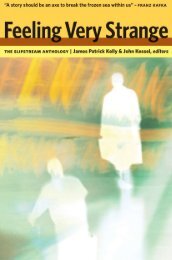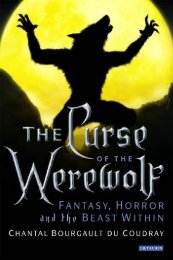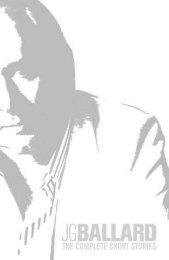A Long Way From Home.pdf - Site de Thomas - Free
A Long Way From Home.pdf - Site de Thomas - Free
A Long Way From Home.pdf - Site de Thomas - Free
- TAGS
- site
- thomas
- zogwarg.free.fr
Create successful ePaper yourself
Turn your PDF publications into a flip-book with our unique Google optimized e-Paper software.
introduction • xxxvii<br />
accent mark (“accursèd”), in lines 5 and 9 the word “Oh” was originally “O,” and in<br />
line 13 “mur<strong>de</strong>rous cowardly pack” is missing a comma between “mur<strong>de</strong>rous” and<br />
“cowardly.” For information about the poem, see William J. Maxwell, ed., Complete<br />
Poems: Clau<strong>de</strong> McKay (Urbana: University of Illinois Press, 2004), 332–33.<br />
14. See Maxwell, Complete Poems: Clau<strong>de</strong> McKay, 333, for the origin of the line “if we<br />
must die” in William Shakespeare’s Measure for Measure (1604).<br />
15. Moreover, Foley showed that Harlem Renaissance “culturalism” and New Negro<br />
radicalism were contradictory i<strong>de</strong>ological poles that should be viewed “as neither<br />
i<strong>de</strong>ntical nor antipodal but as constituting a simultaneous unity and struggle of<br />
opposites.” Barbara Foley, Spectres of 1919: Class and Nation in the Making of the<br />
New Negro (Urbana: University of Illinois Press, 2003), 7.<br />
16. See Lee M. Jenkins, “‘If We Must Die’: Winston Churchill and Clau<strong>de</strong> McKay,”<br />
Notes and Queries 50 (September 2003): 334–35.<br />
17. Maxwell, New Negro, Old Left, 77–91.<br />
18. So anxious was McKay over his exact political role that in a political forum he<br />
quibbled over the exact translation of his words from English to Russian. For this<br />
episo<strong>de</strong>, see chapter 16 of A <strong>Long</strong> <strong>Way</strong> from <strong>Home</strong>.<br />
19. In 1977, Harper and Row released the second half of Black Boy as American<br />
Hunger.<br />
20. For more information, see chapters 16 and 29 of A <strong>Long</strong> <strong>Way</strong> from <strong>Home</strong>.<br />
21. See chapter 21 of A <strong>Long</strong> <strong>Way</strong> from <strong>Home</strong> in which McKay states that he relishes<br />
lived experience as a means of authentication literary expression.<br />
22. Note that Locke retitles the original poem “The White House” again in Four Negro<br />
Poets (1927) as “White Houses” (Maxwell, Complete Poems, 309).<br />
23. Cooper, Clau<strong>de</strong> McKay, 314.<br />
24. Alain Locke,“Spiritual Truancy,” New Challenge 2(2) (Fall 1937): 63–64. For more<br />
information about Locke’s article, see chapter 5 of Gene Andrew Jarrett, Deans<br />
and Truants: Race and Realism in African American Literature (Phila<strong>de</strong>lphia: University<br />
of Pennsylvania Press, 2006).<br />
25. Alain Locke, “Enter the New Negro,” The Survey Graphic Number (March 1,<br />
1925): 633.<br />
26. Locke,“Spiritual Truancy,” 63–66.<br />
27. For more information about the tense relationship between Locke and McKay, see<br />
Cooper, Clau<strong>de</strong> McKay, 225, 261, 320, and George Hutchinson, The Harlem<br />
Renaissance in Black and White (Cambridge: Belknap Press of Harvard University<br />
Press, 1995), 131.<br />
28. McKay quoted in Cooper, Clau<strong>de</strong> McKay, 307.





